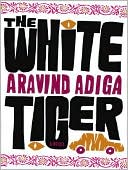

 |

|

The average rating for The White Tiger based on 2 reviews is 3 stars.
Review # 1 was written on 2011-12-13 00:00:00 Darrell James Darrell JamesThis review contains what may be spoilers. Even though I do not think it will spoil your reading experience, I am putting the warning here because one reader pointed it out. -------------------------------------- Before I begin my review, a statutory warning to all my patriotic Indian brothers and sisters... this is India-bashing, large scale. If you are the sort of person who gets all worked up when any aspect of India is criticised, this book is not for you. That said, Arvind Adiga bashes India where it has to be bashed. No honest reader will be able to dispute that the picture of India he paints is a true one. You will find the majority of Indians embarassedly changing the topic when Bihar (the state Adiga names "Darkness") enters the conversation. Most of the things he mentions are not only possible, but probable and even likely. You only have to read any Indian newspaper over the period of a week to know it. But I believe the author fails in the creation of Munna alias Balram Halwai, the protagonist, because his voice is totally out of character with the person. It is the supercilious voice of a Westernised Indian, detached from his home country by education and station in life that comes through. The street smart Munna who murdered his employer and set up his business in Bangalore will talk in an entirely different way (for example, he will never say "five hundred thousand rupees" - he'll say "five lakhs"). Here, the character just becomes a mouthpiece for the author. Secondly, Adiga goes overboard in criticising India, so that some of his examples become rather extreme (the immediate one that comes to mind is the schoolteacher boozing and sleeping in the classroom). In some other cases, they are downright silly (Balram buys a dosa and throws out all the potatoes before giving to Mukesh, whereas he could have bought a dosa easily without the potatoes: these are two varieties). It also confirms the opinion I formed of Adiga from his bio that he is that type of Indian Lord Macaulay wanted to create: Indian only by birth but English in spirit. Lastly, the story failed to hold my interest. Take out all the social criticism and it is nothing but a hollow shell. And the gimmicks, like framing it as a letter to the Chinese premier, are trite to the point of being nauseating. The only thing that forced me to give two stars to this work is some of the pithy statements Adiga makes about Indian society. Especially the ones about how caste-ridden India was a zoo, with all animals in separate cages when the British let them all out, so now only the ones with the big bellies and the ones with the small bellies are left; about automobile horns during a traffic jam joining together to form a single wail like a lost calf wailing for its mother; and the one about how the major diseases India faces are cholera, typhoid and election fever (though I would also include cricket). |
Review # 2 was written on 2016-01-21 00:00:00 Megan Smyth Megan SmythThe White Tiger, Aravind Adiga The White Tiger is the debut novel by Indian author Aravind Adiga. It was first published in 2008 and won the 40th Man Booker Prize in the same year. The novel provides a darkly humorous perspective of India's class struggle in a globalized world as told through a retrospective narration from Balram Halwai, a village boy. In detailing Balram's journey first to Delhi, where he works as a chauffeur to a rich landlord, and then to Bangalore, the place to which he flees after killing his master and stealing his money, the novel examines issues of religion, caste, loyalty, corruption and poverty in India. Ultimately, Balram transcends his sweet-maker caste and becomes a successful entrepreneur, establishing his own taxi service. In a nation proudly shedding a history of poverty and underdevelopment, he represents, as he himself says, "tomorrow." تاریخ نخستین خوانش: روز بیست و یکم ماه ؤانویه سال 2009میلادی عنوان: ببر سفید؛ نویسنده: آراويند آديگا؛ مترجم: نازنین میرصادقی؛ تهران، ایرانبان، 1387، بدون شماره گذاری، شابک 9789642980673؛ موضوع داستانهای نویسندگان هندی - سده 21م عنوان: ببر سفید؛ نویسنده: آراويند آديگا؛ مترجم: مژده دقیقی؛ تهران، نيلوفر، 1389، در 286ص، شابک 9789644484377؛ عنوان: ببر سفید؛ نویسنده: آراويند آديگا؛ مترجم: آزاده نوری روزبهانی؛ تهران، نشرگستر، 1389، در 271ص، شابک 9789645544902؛ عنوان: ببر سفید؛ نویسنده: آراويند آديگا؛ مترجم: مامک بهادرزاده؛ تهران، آوین، 1389، در 344ص، شابک 9789648148428؛ عنوان: ببر سفید؛ نویسنده: آراويند آديگا؛ مترجم: ابوالفضل رئوف؛ تهران، روزگار، 1389، در 334ص، شابک 9789643742713؛ نخستوزیر چین به هند مسافرت كرده، تا درباره ی كارآفرینان هندی پژوهش كند؛ یكی از كارآفرینان هند، نامه ای به نخست وزیر مینویسد و در آن از تجربیات خود سخن میگوید؛ او كه از فقیرترین طبقات هند بوده، با صداقت كامل، مسیر رسیدن خویش به ثروت و قدرت را بیان میكند؛ داستان به صورت مجموعه ای از نامه هاست، و نگارنده در طول آن، خوانشگر را با مردمان، دین، آیین و ساختار سیاسی هند، آشنا میكند تاریخ بهنگام رسانی 03/08/1399هجری خورشیدی؛ ا. شربیانی |
CAN'T FIND WHAT YOU'RE LOOKING FOR? CLICK HERE!!!